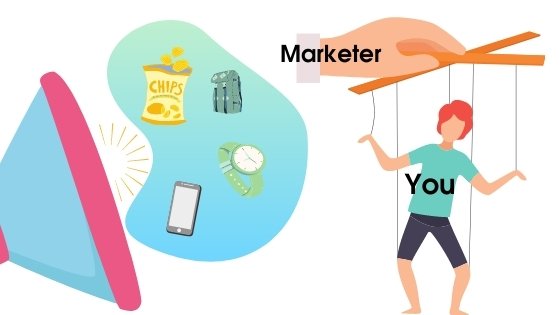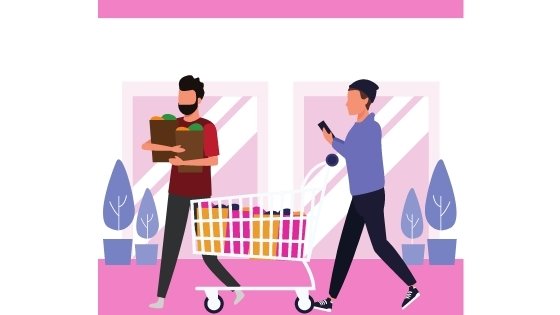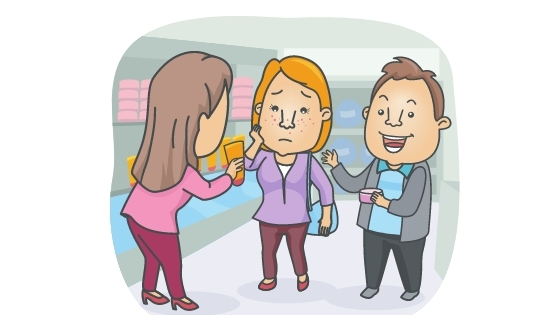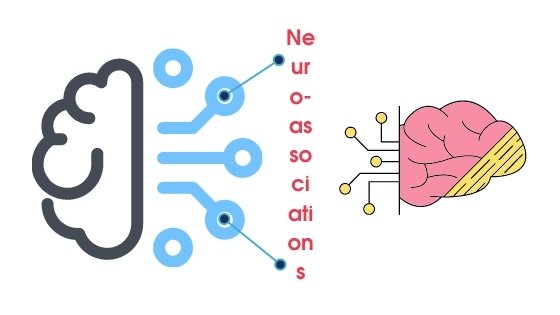Brandwashed Summary by Martin Lindstrom discusses how people are brainwashed right from when they are in the womb and how savvy marketers use sneaky tactics to persuade us or make us addicted so that we spend more money on them.
[amazon box=”0749465042″ template=”horizontal”]
What Is Brandwashing?
Before you proceed, you must know the meaning of “Brandwashing.”
You have heard about brainwashing, right?
Brainwashing is a way of conditioning the brain to make someone act the way you want.
Brandwashing is made up of two words:
Brand + Brainwashing
Today popular brands leverage our psychological weaknesses and manipulate us to purchase more of their products.
Put another way, they brainwash us and make us addicted to their products.
Why? So that we buy from those same brands…again..and again…and again.
No brand will ever want you to stop buying from them.
They want you to spend your life consuming their products by spending all your money on them.
The thing is:
Nobody wants to throw away his hard-earned money.
Or do you?
So brands use psychological techniques to make you empty your wallet thinking that you are the one making the decision. But in reality, brands are the ones manipulating you.
The worst part?
We can’t exist without brands.
The author tried going on a brand detox once.
And guess what happened? He failed miserably.
(Don’t take my word for it. Try it yourself if you have guts.”)
You can’t say:
“I won’t buy anything from any brand ever again.”
Because ultimately, you’ll have to.
So what’s the point of reading this anyway?
The point is:
Even though the brands’ invisible spells always surround you, you must know how to make intelligent and conscious decisions.
And this summary will teach you all that.
Only condition? You’ll have to stick around till the end.
Brandwashed Summary (PDF)
By the end of this summary, you’ll be better equipped to get out of those invisible spells set by the brands and make good choices for you —not for brands.
Let’s get started!

Brandwashing Starts In The Womb
The author found out that a baby can hear the outside sound inside the womb during his research.
And brands know this very well.
So they tweak their marketing strategies and even target unborn babies.
Sounds crazy, right?
They introduce catchy jingles in their advertisements.
You may think, “why unborn babies? why not adults?”
Brands generally target everyone that is a prospect to them.
When brands target unborn babies and adults, they can nurture them and make them their loyal customers over time.
They make more money when someone is wired to buy their stuff.
Brands don’t want you to overthink.
They want you to open your wallets. They want to control when you open and close them.
As a result, kids become the prime targets of big brands.
No doubt why young children are bombarded with advertisements.
Ads are one of the ways brands position themselves inside children’s brains.
Sometimes, when those kids grow up, they even unconsciously start marketing the products they use.
The author says that brands use many subtle strategies to make you buy their stuff.
One of them is nostalgia.
Brands Try To Provide You A Nostalgic Feeling And Trick You Into Buying Their Products

The author says that we tend to buy those products that remind us of when we were young.
This trick works for adults.
So how do brands make you feel nostalgic?
To achieve that, they try to create an environment that usually has the smell and sound that you liked as a kid.
For example, they fill the malls with aroma or the smell of Johnson’s powder or play a particular type of music that evokes nostalgia.
Such aromas or music make you feel at home.
And you get more comfortable buying more products.
See the benefit of brandwashing kids?
If you liked a particular brand’s product as a kid, you would be more likely to repurchase it.
Every advertisement you watch on TV or every hoarding you see on the side of a road leaves an impression on your mind.
And when you encounter a similar environment in the future, you feel nostalgic.
And you don’t even realize why that happened.
What Lies Behind The Loyalty Of A Customer?
The author talked about it a little in the book.
Have you ever wondered why do you prefer certain brands over others?
For example, I somehow get drawn by Colgate when it comes to toothpaste.
And it’s not that I like Colgate. It happens subconsciously.
Why is this so?
The author says that we all have influences and beliefs that make us do that.
If you saw your parents buying Colgate every time as a kid, you’d prefer to buy Colgate too after you grow up. Such habits may run in your family.
Brands always want a loyal customer who often buys more than a customer who buys sometimes.
Other times, children may influence their parents.
For example, if a kid demands his parents to buy a pizza from a particular brand, lovely parents would try to fulfill his wish and buy him that.
That’s why brands ensure that they attract kids to their stores.
Because they know that if they attract more kids, they will have more orders. And ultimately, their revenue will grow.
The author says that children carry their brand preferences from childhood to adulthood.
And these preferences can be developed by effective marketing.
The worst thing is:
Despite knowing all of this, you’ll not be able to avoid brandwashing.
So if you are a parent, you can make sure that your kids don’t prefer a particular brand and develop the ability to choose a brand by logical reasoning.
Watch the type of advertisements you expose yourself to.
Avoid watching a lot of TV if possible.
Especially watch your habits. Kids tend to pick habits from their parents.
Also, don’t spend money on stupid things like cigarettes or alcohol. (…Unless you want your kids to do the same.)
The author found out that children whose moms used to smoke developed a smoking habit in adulthood.
Stay away from those brands which you don’t want to get inside the mind of your kids.
Remember, brands know more about your behavior than you will ever know. They keep experimenting and optimizing their strategies to make more profits.
Unless you deliberately choose to make conscious decisions, you’ll remain under their marketing spells.
Fear Is A Complex Emotion That Is Used As A Marketing Tactic —Learn How.
Imagine if the world gets hit by another pandemic.
Who do you think would get more business?
It’s hand sanitizer companies.
Why?
Because more and more people would be scared and try to maintain proper hygiene.
The idea here is:
Fear sells amazingly well.
If a marketer figures out what scares you the most, he can tap into that fear and sell you his product as a solution.
But fear isn’t always unpleasant, says the author. It can be pleasant too.
People drive at crazy high speeds. Don’t you think they fear? They do. But they enjoy the thrill more than they fear the injury.
Fear can be rewarding when you know there isn’t any real threat.
If you get scared of real danger, you try your best to escape.
But when you know that fear isn’t real, you enjoy it.
Weird, but this is the same thing that happens when you watch horror shows.
You know there isn’t any ghost for real. You know you won’t die even if you see a ghost in that show or movie. But at the same time, you enjoy the thrill and suspense you feel while watching those shows.
People are ready to pay money to have such horrifying experiences. Can you believe this?
Most people like roller coaster rides due to the same reasons.
No matter how you put it, if the threat isn’t real, fear can be sold through marketing strategies. And people will buy it: either to avoid future pain or to have a thrilling experience.
Marketers never leave an opportunity to introduce fear in their marketing campaigns.
Because most people stop thinking clearly when they are afraid.
And that’s what marketers or companies want you to do.
They don’t want you to think.
They want you to swipe your credit card and BUY.
Are You Brand-Addict?
Ever wonder why you can’t stop eating until you finish the entire potato chip bag or the whole chocolate?
The reason?
Companies make sure that you get addicted to their products. They make sure that you keep eating or consuming them.
Yes, brand addiction is a thing.
Usually, people associate addiction with alcohol, cigarettes, etc.
But the author says that people can get addicted to shopping too.
Like any other addiction, brand addiction also happens due to dopamine release in our brains.
You get a dopamine high every time you consume a product, and your mind craves more of it…
Result? You do binge consumption of the products.
(Ya know? A product could be anything.)
Most companies study human behavior and specifically use secret ingredients in their products to make you addicted.
And it’s not just about eating tasty food.
Companies make their products highly accessible and effortless, which further pulls you more towards their products. For example, Netflix automatically plays the next episode so that you keep binge-watching all the episodes of a TV show.
Beware of brand addiction; it could empty your wallet fast.
So How And Where Does This Addiction Thingy Start?
It has to start somewhere, right?
Just like anything, addiction to a product also has a first time.
As the adage says, “There is a first time for everything.”
For example, smokers become regular smokers after consuming their first cigarette, not before that.
Alcoholics don’t become alcoholics right after drinking alcohol for the first time.
Okay, let me get straight to the point.
Addiction has a lot to do with our habits or routines.
“Once something is part of our routine, it becomes almost impossible to shake.”
Martin Lindstrom
Often a pattern is noticed:
- First, you consume a specific product.
- Then you like it. (Hit a dopamine high)
- Then you want more of it.
- You consume it again.
- Gradually, consuming it becomes a daily routine.
- After some time, you can’t live without it.
- Eventually, you turn into an addict. (Congrats! You are officially doomed.)
The author says that most people form addictions when they are more relaxed. That’s usually the time when you’re most vulnerable.
For example, when you’re in your office working your ass off, you won’t have time to think about other fun things. You’ll be focused on the work at hand.
But when you enjoy your vacation, you feel relaxed and want to have fun. That’s usually you get introduced to addictive products.
We all want to take a break from our boring lives.
We all want to party and eat delicious cuisine.
Deep down, we all have desires that must be fulfilled.
Or don’t you?
Don’t you think marketers already know about this? Of course, they do.
The author says that we think we are in control, but we are powerless when it comes to our cravings and triggers.
What’s worse? We don’t realize it when that happens.
We unconsciously start acting.
All this may sound theoretical, but it is indeed a frightening thing.
Question is:
How can you avoid brand addiction?
There is no easy way. But it’s possible.
You just have to figure out a way to break the pattern of addiction we discussed above.
Here is my suggestion.
Don’t want to be an alcoholic? Never touch it in the first place.
Don’t want to be a smoker? Never buy one.
Why should you take my advice seriously?
The author says that your brain is changed forever once you get used to those addictive products.
There is a point of no return.
So it’s much better to avoid such products before you get addicted to them and make their consumption a daily routine.
Peer Pressure Might Affect Your Buying Behavior

Admit it.
When you see your friend using an expensive featured device, don’t you feel a need for it?
That’s peer pressure for you.
The author says that we are wired to copy our peers.
For example, when we have no idea what to do, we look at what others are doing.
And then we copy them blindly.
Well, not all of us do that. But most people do.
Know why there are only thousands of true leaders and millions of followers?
Simply because not many people have the right idea of what they should do, they follow other people. Sometimes without thinking about the consequences.
We are social animals. We follow the crowd. (Most of us)
So how does all this affect our buying behavior?
Simple. People will want a product if everyone wants a product.
Let’s say, if people like to buy a particular brand’s burger, most people will prefer purchasing that burger over other alternatives.
Reason? Because they have seen their friends or other people buying that.
Most people would assume that it would be awesome if everybody were buying that burger.
And naturally, they would develop a craving for it.
Again, companies know all this very well.
So marketers try to create trends or fads so that more people would buy them.
If you want to be an intelligent customer, use your thinking.
Reason!
There is no guarantee what other people want or have is right for you. It might be the opposite.
The crowd doesn’t reason.
So you have to do the “thinking” part if you want to make intelligent buying decisions and save some money.
Another way peer pressure affects our buying behavior is we don’t want to stand out.
Allow me to explain.
We deeply care about what other people (especially our friends and family) think about us.
So if our dear ones like doing something, we often go with the flow.
For example, if all your friends like watching and conversing about a popular TV show like Game Of Thrones, you’d also like to watch it. Or at least think about watching it.
Why? Simple, because you won’t want to stand out as someone who hasn’t watched such a popular show.
You want to fit in with your friends, don’t you?
Nobody in the world wants to look like a weirdo in front of his dear ones.
Brands exploit this psychological weak spot.
Companies love to brag or show that every person in the world is having a great time consuming or owning their products.
Another example is if your friends are buying ice cream, you’ll probably end up buying one.
Knowingly or unknowingly, peer pressure can determine your buying preferences.
Beware! Companies Are Tracking You.

Would you like to tell me your secrets so that I can share them with a stranger? Definitely, not.
We all want to keep our privacy regarding sensitive data, right?
But what if I tell you that privacy is sort of a myth these days.
Surprised?
I hate to say it, but this is precisely what is happening these days.
Every company is after your data.
They want to create your virtual avatars so that they can understand your deepest desires and use that information to sell you their stuff.
Maybe you already know this.
But if you have just uncovered this fact, it might give you goosebumps.
Do you think you know yourself more than anyone? Think again.
The worst thing is:
As technology is advancing rapidly, the situation will get even worse in the future.
More and more companies will find sneaky ways to collect your data.
There are sophisticated models built using AI only to collect and analyze your buying behavior.
Such models can even predict things like what you’ll buy next and how often you will buy it for the next few months.
It sounds unbelievable, but companies take these things seriously and work in that direction.
Just consider your mobile phone. It doesn’t matter if it’s Android or iOS. It’s stealing data without even notifying you.
It keeps track of all the activities you do on your mobile phone. For example:
- For how long you use a specific app?
- What apps do you use more?
- Who are your friends?
- What are your habits?
- What triggers you to click?
- Which websites do you spend most of your time on?
- How often do you purchase, and what?
- … And a lot more things like that, which you can’t even comprehend.
And all this isn’t to scare you. It’s to inform you about reality.
The scary thing is, you don’t even get notified.
Anyway, do you think a thief would tell you before doing a theft? I don’t think so.
Likewise, companies keep stealing your behavioral data under your nose.
So while you are busy watching Youtube, it’s collecting your data and optimizing its algorithms (maybe in real-time) to keep you hooked.
How to deal with this?
My suggestion would be to become conscious of what permissions you give to specific apps. (Still, this won’t fix the problem that much because if someone wants to steal, he would.)
Choose what you do.
Put another way, don’t always go with the flow.
So even if you’re watching Youtube, don’t just click on what’s recommended to you. Make deliberate choices. Search for what you want.
Huh! Hate to say it, but the algorithms are sophisticated, and they keep studying and analyzing your behavior every time you make a purchase using data mining techniques.
The point is:
Companies will always find some way to gather all your data and store it in their databases no matter what you do. And they will use that data to upgrade themselves and influence you to buy from them.
The author says that companies like Walmart have a vast database full of our precious data. He says that Walmart collects all that data at the point of sale when the customer uses his credit/debits card.
All this happens without the customer’s awareness about it. He never realizes that his data is stored in a vast database.
If you dig deeper into your behavior, you’ll realize that you follow specific patterns in your buying behavior. You have habits and preferences.
The companies closely study these clues and can estimate the time and frequency of future purchases.
Cruel, isn’t it? But that’s the world we live in.
There are so many things happening behind the scenes.
What you see is the tip of the iceberg.
You never realize the importance of your data and money.
But all companies or brands do.
Irony.
They are after your wallets.
I think you must guard your wallets and put them to fair use. Or at least use it for something that adds value to you.
By asking yourself if your decisions are biased and peeling off the layers of self-awareness, you may avoid some of those traps.
Remember, you are being watched and tracked.
Privacy doesn’t exist anymore.
So keep your eyes open.
(Shh! Don’t keep your wallets open.)
Our Brains Form Associations And Patterns, Which Affects Our Buying Behavior.

We love to connect the dots in our minds.
If there is an open loop, we don’t relax until we close it.
How does this affect marketing?
Marketers use images and words that leave clues.
For example, marketers who sell health-related products use certain vibes in their advertisements to give you a peaceful or positive feeling.
Even the products are given specific shapes to make you believe in the idea behind the product.
You may have seen the bottles of women-related products have curves.
Or some product advertisements show the Himalayas to plant the idea of calmness and peacefulness inside your mind. As if you would become tranquil after using those products.
The catch is:
They don’t directly sell you the benefit sometimes.
It’s possible that the product might not have such a benefit in the first place. But your mind will form connections and itself imply the benefit.
So you’ll buy it based on implied benefit in that case.
Marketers deliberately leave the trails and cues. So when you or your mind follows them, it feels as if you are the one making decisions, but it was the marketer who knew what you’d do all along.
Don’t stress yourself if you didn’t understand what I said in this lesson. This is an advanced technique used by experienced marketers.
The Key Takeaways From “Brandwashed” by Martin Lindstrom
I know you must be cognitively overloaded by now…if you’ve read the entire summary without skipping any line.
Pat yourself on the back.
Let’s recap some of the critical points you learned from this summary.
- You have been brandwashed every moment of your life ever since you were born.
- Marketers use smart strategies to sell you dreams, hopes, and desires and make you spend money.
- Both parents and children influence each others’ buying decisions.
- Data is oil for businesses. That’s why they track your behavior and use sophisticated machine learning algorithms to predict your future buying behavior.
- We don’t want to be left out, so we buy what our friends buy.
- Brands make more money when you get addicted to their products.
- Most important, you must know all those tricks to save yourself from being brandwashed.
Want to keep reading?
Check out other business/marketing summaries like this:
Also, get instant access to 2000+ non-fiction summaries, audiobooks, and author podcasts on the Blinkist non-fiction summary App.
Don’t know about Blinkist? Read the full review here.
Or Join my free newsletter to stay updated.
Brandwashed Review
[amazon box=”0749465042″ template=”horizontal”]
I found this book very practical and fun to read as a marketer.
If you’re not a marketer, this book will help you not get brandwashed.
I highly recommend everyone read this book because knowing these ideas can change your life. You’ll be able to make smart decisions while buying anything.
This book is filled with a lot of experimental research, meaning, in each chapter, the author discusses what he learned from those experiments.
The author shares dirty tactics used by the companies to steal your data.
So if you’re into marketing or want to become a smart buyer, don’t overthink. Just give this book a read. This has something for everyone.
It’s your turn now
I guess this Brandwashed Summary would help you become more aware of the strategies companies use to brainwash you and turn you into their frequent customers.
And if you’re a businessman, you must have learned some fantastic strategies to increase your revenue.
That’s it.
Now it’s your turn.
What new thing did you learn from this summary?
What steps will you take to guard yourself against brandwashing in the future?
Let me know in the comments.
And one last thing…
Please share this summary with those who can make use of it.
